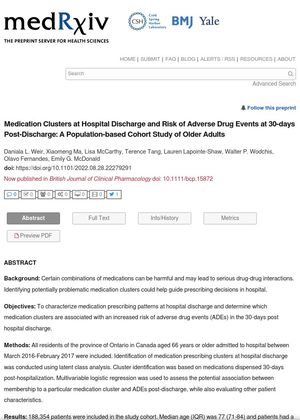Medication Clusters at Hospital Discharge and Risk of Adverse Drug Events at 30-Days Post-Discharge: A Population-Based Cohort Study of Older Adults
August 2022
in “
medRxiv (Cold Spring Harbor Laboratory)
”

TLDR Certain groups of medications given when leaving the hospital are linked to a higher risk of negative drug reactions within 30 days, especially in older adults with respiratory issues.
The study analyzed medication prescribing patterns at hospital discharge for 188,354 older adults in Ontario, Canada, and their association with adverse drug events (ADEs) within 30 days post-discharge. The patients were divided into six clusters based on their medication dispensing patterns: Cardiovascular (14%), respiratory (26%), complex care needs (12%), cardiovascular and metabolic (15%), infection (10%), and surgical (24%). The study found that 12,680 (7%) patients experienced an ADE within 30 days of discharge. After adjusting for other patient characteristics, the respiratory cluster had the highest risk of ADEs (aOR: 1.12, 95% CI: 1.08-1.17), while the neurocognitive & complex care needs cluster had the lowest risk (aOR:0.82, 95% CI: 0.77-0.87). The study concluded that ADEs post-discharge are linked to identifiable clusters of medications, in addition to non-modifiable patient characteristics like age and certain comorbidities. This information could help clinicians and researchers understand which patient populations and interventions may reduce the risk of ADEs.